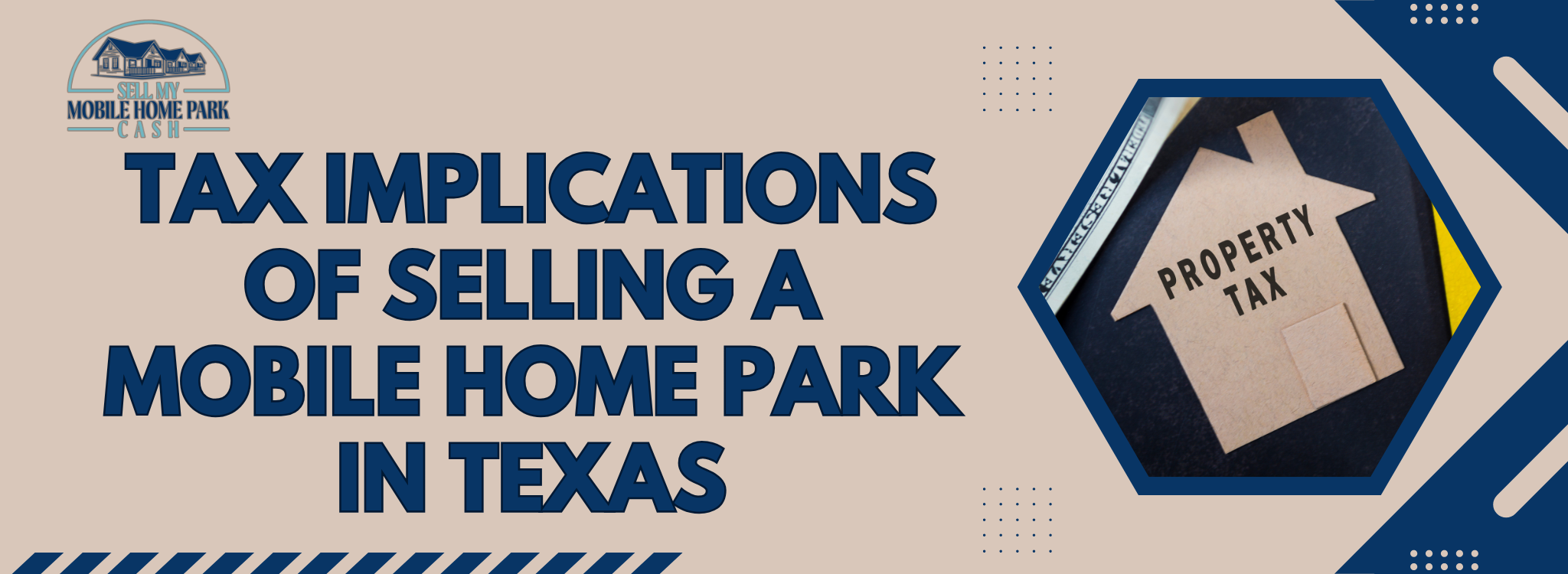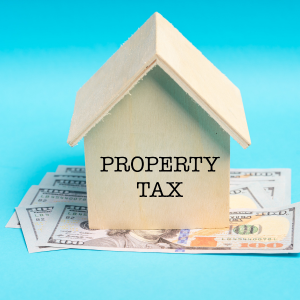
Tax Considerations When Selling a Mobile Home Park in Texas
Selling a mobile home park in Texas offers exciting opportunities, but similar to any financial venture, it also has its thrilling prospects along with a set of tax responsibilities, such as property tax and investment tax relating to the mobile home park. In Texas, proper financial planning can ease the tax burden.
What Taxes Are Incurred With The Mobile Home Park Sale Agreement?

While selling a mobile home park, you should be aware of your tax responsibilities. At a minimum, you must submit state taxes on income earned and the real estate transfer tax. For Texas residents, understanding how to file state taxes in Texas is key to remaining compliant.
What Impact Does Capital Gains Tax Have?
A capital gains tax also applies to the sale of a mobile home park. There is also the additional income that comes with the sale, and once taxes are settled, there is a need to reevaluate the seller’s financial strategy. Every dollar counts in Texas, so understanding mobile home investment capital gains taxes will help with planning in the future.
Conditions and Requirements for Tax Deductions
There are several deductions one can apply to taxes owed in Texas, and these deductions can lower the mobile home parks’ sales tax. Ensuring the sales measures are accurate can lead to achieving the right deductions.
Understanding Depreciation Recapture in Texas

Depreciation recapture, which is the reclaiming of tax depreciation, is the tax depreciation already claimed. It is of great importance to consider the costs and potential taxes involved.
What Is Depreciation Recapture?
Recaptured depreciation is defined as the tax on any depreciation of the specified asset that is disposed of. In the case of mobile home parks, these are the key questions that will answer how much tax is to be paid in relation to the mobile home park sale.
What is the Effect of Recapture Depreciation on Tax Liability
Recapture depreciation can significantly affect the tax liability for mobile home park sellers in Texas and the entire US, both on the state and federal levels. The nature of these items helps build the framework for tax planning to avoid unnecessary costs.
Ways to Mitigate Its Impact
Tax strategies that allow deferrals applicable in Texas may assist in alleviating the effects of depreciation recapture. Looking into these strategies could ease the financial stress of selling your mobile home park.
1031 Exchange: A Strategy for Deferring Taxes

A 1031 exchange is a viable option for Texan mobile home park sellers to gain tax deferral. This strategy allows for selling a property and buying a similar property, and it defers the capital gains tax on the sale. Having a solid grasp on 1031 exchange strategies enhances decision-making and improves tax planning.
What Is A 1031 Exchange And How Does It Work
In Texas, mobile park sellers frequently utilize a strategy known as a 1031 exchange, named after the section of the Internal Revenue Code that permits deferral of capital gains tax on investment properties. As with any strategy, there are some restrictions. The sold and purchased properties have to meet the “like-kind” standard, which pertains to the property’s character or usage. This strategy serves to aid the sellers in deferring tax obligations, thus enabling tax capital.
What Benefits and Restrictions Come With This Tax Approach?
Thanks to a 1031 exchange, you can expand your investment portfolio while deferring taxes. This works especially well in Texas when taxes are significantly saved on high-value mobile home parks. With that being said, there are restrictions. A new property has to be identified in 45 days, and you must complete the entire transaction in 180 days. No properties are exempt, and there are no second chances. Every single one of these factors has to be weighed while planning tax strategies in Texas.
Steps to Execute A Successful 1031 Exchange in Texas
In order to execute a 1031 exchange, you must go through these steps:
- Get your qualified intermediary: This person will manage the entire exchange process.
- Sell your current property: This has to be completed within the 1031 exchange guidelines.
- Identify a replacement property: You must locate like-kind properties within 45 days.
- Complete the exchange: You must acquire the identified property within 180 days.
By completing the steps provided, you will be able to benefit from tax strategies in Texas.
Estate and Inheritance Tax Planning for Mobile Home Parks

Understanding estate and inheritance taxes is crucial for selling mobile home parks in Texas. Strategic planning allows for taxes to be minimized and the benefits for heirs to be maximized.
What Estate Tax Benefits Does a Seller Get?
There are estate tax consequences to selling a mobile home park. In Texas, estate tax planning is crucial for property transfer. If the estate exceeds the federal exemption limit, the estate becomes tax burdened and the payout would be far lower than what the beneficiaries anticipated. With proper trust and estate tax planning, the tax burden can be alleviated, leading to smoother sales in the mobile home parks.
What Strategies In Estate Planning Have Worked Best?
Asset assignments, life insurance, and trusts are some strategies in use. These approaches can be particularly effective in lowering estate taxes and facilitating the transfer of assets. Planning mobile home park estate taxes enhances the odds of success when tailored to the specific situation.
Understanding Inheritance Tax for Mobile Home Parks

The transfer of wealth or assets after someone has passed on is called an inheritance tax. In Texas, there is no state inheritance tax; however, federal laws might apply. In Texas, a mobile home park is an investment worth considerable wealth. Tax planning for mobile home parks is extremely critical, especially considering the potential tax burdens. Strategies utilizing trusts can reduce estate tax and subsequent trust obligations and minimize tax burdens on the beneficiaries.
The suggested tax planning activities for mobile home parks will definitely facilitate informed decisions and provide long-term gains for your mobile home parks in Texas. Whether planning estate taxes or looking to undergo a 1031 exchange, mobile home park owners in Texas have several options to improve their finances.
Federal and State Tax Filing Requirements
Inheritance tax refers to the tax imposed on the estate of the deceased. As for the State of Texas, there is no state inheritance tax, but some federal taxes could apply. Knowing about federal taxes on transferring liabilities and taxes later on can help you keep some money. With sophisticated estate and tax planning, possible strategies can be considered to reduce the tax burden on the heirs of your mobile home park.
What Federal Tax Regulations Apply to Park Sales?
Mobile home park sales are subject to federal taxes, and therefore, there is tax liability on selling mobile home parks. This, too, influences your taxable income. Sales of such parks are controlled by the IRS, and there is tax to be paid on them. There are certain IRS regulations that pertain to such sales and it is prudent for you to be informed about them to better manage your finances.
How to Comply with State Tax Filing Obligations in Texas
There are state tax filing obligations for Texas that are well defined. A taxpayer in Texas, for instance, is required to uphold and compliantly go by the tax obligations that are in the state. This is critical for the seller of mobile home parks since failure to meet tax obligations could result in challenges.
Are There Local Tax Regulations Unique to Texas?

Each region in Texas possesses its own local tax regulations, which in turn impact property ownership. Property tax considerations, alongside zoning requirements, are essential in understanding the mobile home park tax selling implications.
Financial Planning and Tax Liability Management
Enhanced financial planning simplifies the selling of a mobile home park in Texas. There are tax obligations to be met, which financial strategy can help reduce. Overall, having a solid plan helps you to respond to the financial maneuvers you may face.
How to Plan Financially for High Tax Liabilities?
High tax liabilities can be tough, but good planning can make them easier. Look at ways to reduce the tax burden to lessen the financial load. Thoughtful financial planning is necessary when selling a mobile home park.
What Role Can a Tax Advisor Play?
A smart tax advisor can be very helpful when selling a mobile home park in Texas. They give expert tax professional consultation to help you with legal tax obligations and improve your financial outcomes.
Maximizing Tax Efficiency in a Mobile Home Park Sale
Selling a mobile home park in Texas can help you save on taxes. You can use special tax efficiency strategies for this state. First, check the effective tax rate for your mobile home park in Texas to plan better. Reducing your tax burden and looking into tax deferment strategies are good ideas, too. Remember the capital gains tax when you sell, as it greatly affects your taxes.
How Can You Reduce Your Effective Tax Rate?
Try lowering the effective tax rate to pay less tax when selling your mobile home park in Texas. Check your taxable income from the sale to find ways to cut your tax liabilities. A tax professional can help find ways to reduce these costs.
What Are the Best Practices for Tax Season Preparation?
When selling a mobile home park in Texas, preparing for tax season is important. Talk to a tax professional so you don’t miss any deductions or credits. Financial planning is key; start early to get all your paperwork in order. This will make paying taxes easier and might save you money.
Utilizing Tax Credits and Shelters for Future Developments

For future mobile home park projects, use tax credits and tax shelters. These give you good tax deduction opportunities in Texas. Planning for these helps lower what you owe in taxes and boosts profits. Keep up with any changes to stay compliant and benefit the most.
The Role of Professional Consultation in Tax Matters
Talking to a tax professional in Texas is smart for dealing with taxes. They ensure you meet all legal tax obligations and offer ways to lessen your tax load. Their knowledge about mobile home park taxes is very helpful and can prevent expensive mistakes.
Why Should You Consult a Tax Professional Before Selling?
Before you sell your mobile home park, chat with a tax advisor in Texas. They help with financial planning and ensure you follow all tax reporting requirements. Their advice can improve your sales plan while keeping you out of trouble.
How Can Legal Advice Support Tax Compliance?
Legal advice is key for meeting tax compliance when you have a mobile home park in Texas. Knowing IRS regulations and following legal tax obligations protects you from audits and fines. Law experts can help you understand tough tax rules, giving you peace of mind.
What to Expect During a Tax Audit Preparation?
Preparing for a tax audit means knowing your duties under Texas law and IRS regulations. Making sure you’re fully tax-compliant is key to an easy audit. Keep your records tidy and work with experts in mobile home park taxes. Their help is crucial in satisfying auditors and clearing up any issues quickly.
FAQs:
What are the tax implications of selling a mobile home park in Texas?
Selling a mobile home park in Texas can lead to taxes, like capital gains taxes. It’s crucial to know the effects of zoning and tax. Talking to a tax expert can help you understand specific tax outcomes and possible deductions or credits.
How do I handle the transfer of ownership for a Texas mobile home park?
To transfer ownership of a mobile home park in Texas, you must consider legal and tax matters. Key steps include getting a proper valuation and meeting tax invoice needs. It’s helpful to consult experts on mobile home park transactions.
What are my options if I’m struggling with tax burdens from selling my manufactured home park?
If you’re facing tax problems from selling your manufactured home park, you might look into tax credits or exemptions, like the homestead exemption in Texas. Talking to a financial advisor about asset allocation and retirement planning could also be helpful.
Are there capital gains tax exclusions when selling a mobile home park in Texas?
Yes, you might qualify for capital gains tax exclusions when selling a mobile home park in Texas. To find out if you can, it’s a good idea to research current tax rules and talk to a tax specialist who knows about mobile home park sales.
How can zoning changes affect the sale of my mobile home park in Texas?
Zoning changes can alter the market value and tax outcomes when selling your mobile home park in Texas. Staying updated on local zoning laws is important, as these can impact the sale process. Getting expert advice can help you understand these changes.
What should I know about inheritance tax for a mobile home park in Texas?
In Texas, inheritance tax is important when planning your mobile home park’s future. Knowing how ownership transfer affects taxes can help in estate planning. It’s wise to consult an estate planner who knows Texas laws well.
How does a land lease affect tax implications for mobile home parks?
A land lease can affect income and deductions for mobile home parks, changing the tax situation. Understanding the lease details and their tax impact is crucial. Advice from real estate and tax professionals can clarify these issues.
What are the benefits of understanding partnership tax considerations in Texas?
Knowing partnership tax rules can help make operations smoother and potentially benefit the tax outcomes for mobile home parks. Good advice can guide you through complex tax requirements and help you gain possible advantages, ensuring you follow the law and stay profitable.
Key Insights
- Selling a mobile home park in Texas can be tricky because of taxes. It is important to know the sale price, ownership transfer, and any possible capital gains.
- We help people sell their mobile or modular homes without making mistakes that can cause problems later.
- If you’re considering buying or selling a manufactured home or trailer in Texas, research how taxes and needed improvements can change your income and deductions.
- Understanding different home types, such as manufactured homes and trailer parks, is key to determining taxes in Texas, Alabama, and Alaska.
- Sellers should ensure they claim all eligible deductions and follow tax rules to avoid issues with capital gains tax.
- Our team provides information to help you understand real estate deals and make them good for your money.
- On social media, like Instagram, we give useful tips and answers about selling and moving mobile homes.
- Be aware of taxes in Texas and states like Pennsylvania, Rhode Island, Utah, Vermont, Virginia, Hawaii, Idaho, Illinois, Columbia, Florida, and Georgia to ensure compliance.
- Always talk to a tax professional to understand all possible outcomes, including how your situation might differ.
This information is specific to Texas, where we specialize in buying mobile homes. Additionally, we purchase mobile home parks nationwide, extending our services to states such as Connecticut, California, New York, Florida, and many others. Whether you’re in Texas looking to sell a mobile home or anywhere in the country with a mobile home park to sell, we’re here to assist. For more details, Contact Us at (833) 685-2274 or visit our website. Let us help make the selling process seamless and stress-free!
Sell Your Mobile Home Park In Texas Today
We buy mobile home parks in ANY condition, situation, and price range in Texas. There are no commissions or fees and no obligation whatsoever. Start below by giving us some information about your trailer park or call (833) 685-2274.

